Quote of the Month:
“Nature gives to every time and season some beauties of its own." - Charles Dickens
“Nature gives to every time and season some beauties of its own." - Charles Dickens
Have you ever thought about trying a long-distance hike? Or maybe even dared in your dreams to complete end-to-end hike of one of the longest American trails such as the Appalachian Trail, or Colorado Trail or maybe Pacific Crest Trail? If you had a desire to go into nature but all the time found some excuses not to do this, we want to introduce a special person to you, who hasn’t just thought and dreamed about this, but fulfilled his dreams into reality.
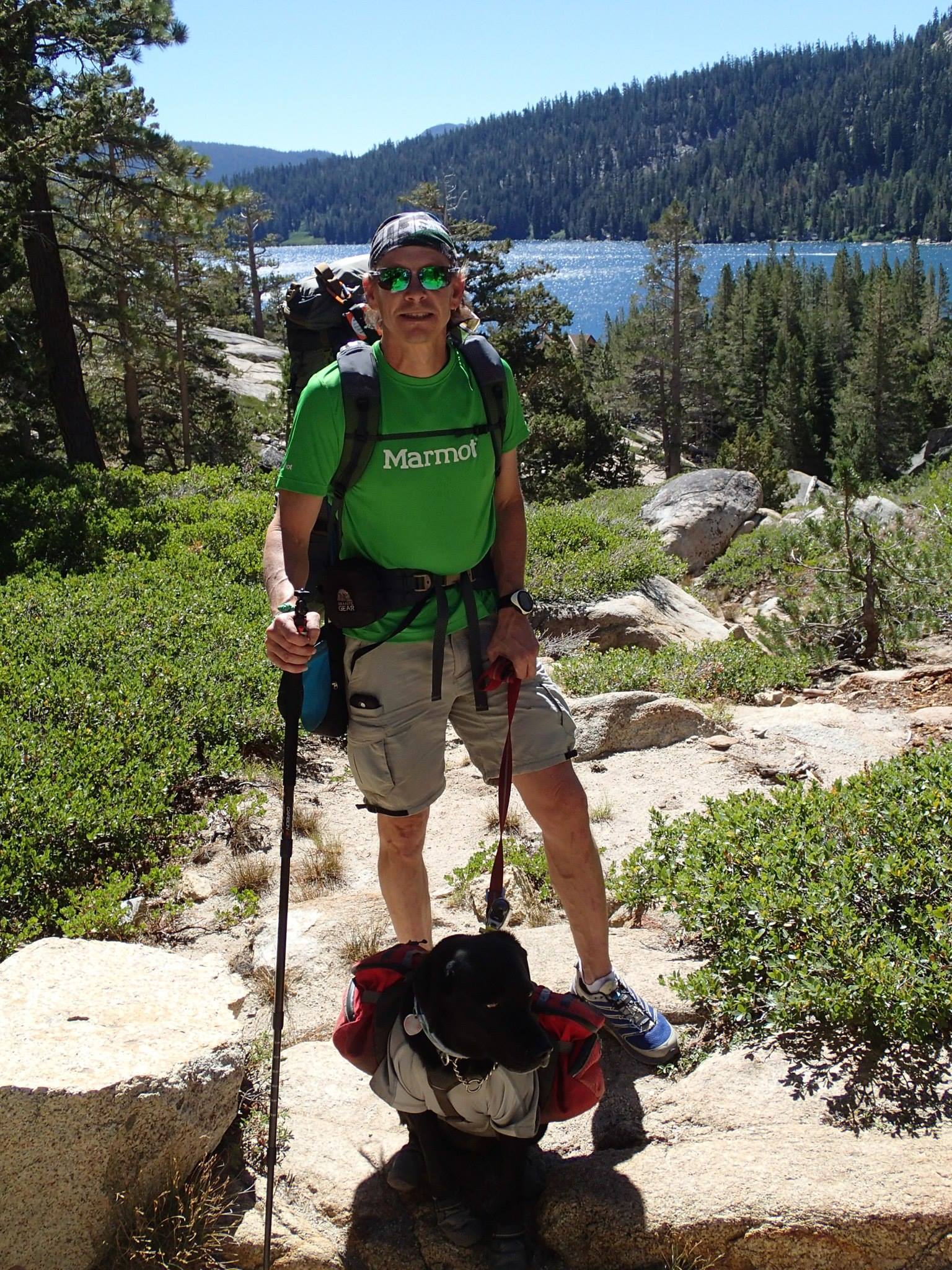 Trevor Thomas, a 47 years old resident of Charlotte, N.C., about ten years ago used to be a regular American, who had just finished a law school and was building his legal career and who was in love with extreme sports. But his life was changed once and forever in 2005 when he was diagnosed with a rare eye disease resulting in Thomas losing his vision within 8 months. After this tragedy, in a situation when lots of people would’ve sunk into despair Trevor Thomas managed to prove the whole world that the societal expectations set for blind people are too low.
Trevor Thomas, a 47 years old resident of Charlotte, N.C., about ten years ago used to be a regular American, who had just finished a law school and was building his legal career and who was in love with extreme sports. But his life was changed once and forever in 2005 when he was diagnosed with a rare eye disease resulting in Thomas losing his vision within 8 months. After this tragedy, in a situation when lots of people would’ve sunk into despair Trevor Thomas managed to prove the whole world that the societal expectations set for blind people are too low.
In 2008 after only 18 months of preparations he hiked the entire Appalachian Trail (and this is almost 2,200 miles), thus becoming the first blind person who completed an unassisted thru hike of this trail.
Since then eight years have passed, and now Thomas has an experience of almost 20,000 hiked miles under his belt. In 2012 he graduated together with Tennille from Guide Dogs for Blind and since then he has a faithful friend and reliable companion for his travels. Together they have already visited so many places that most sighted people have never dreamed of seeing.
Thus far Trevor Thomas continues to explore new trails, inspiring many people, especially those afflicted with disability, to step out of their comfort zone and achieve the heights they were only dreaming of before. He is a motivational speaker, internationally-known sponsored athlete and the founder of Team FarSight Foundation.
Today we had a chance to ask him several questions.
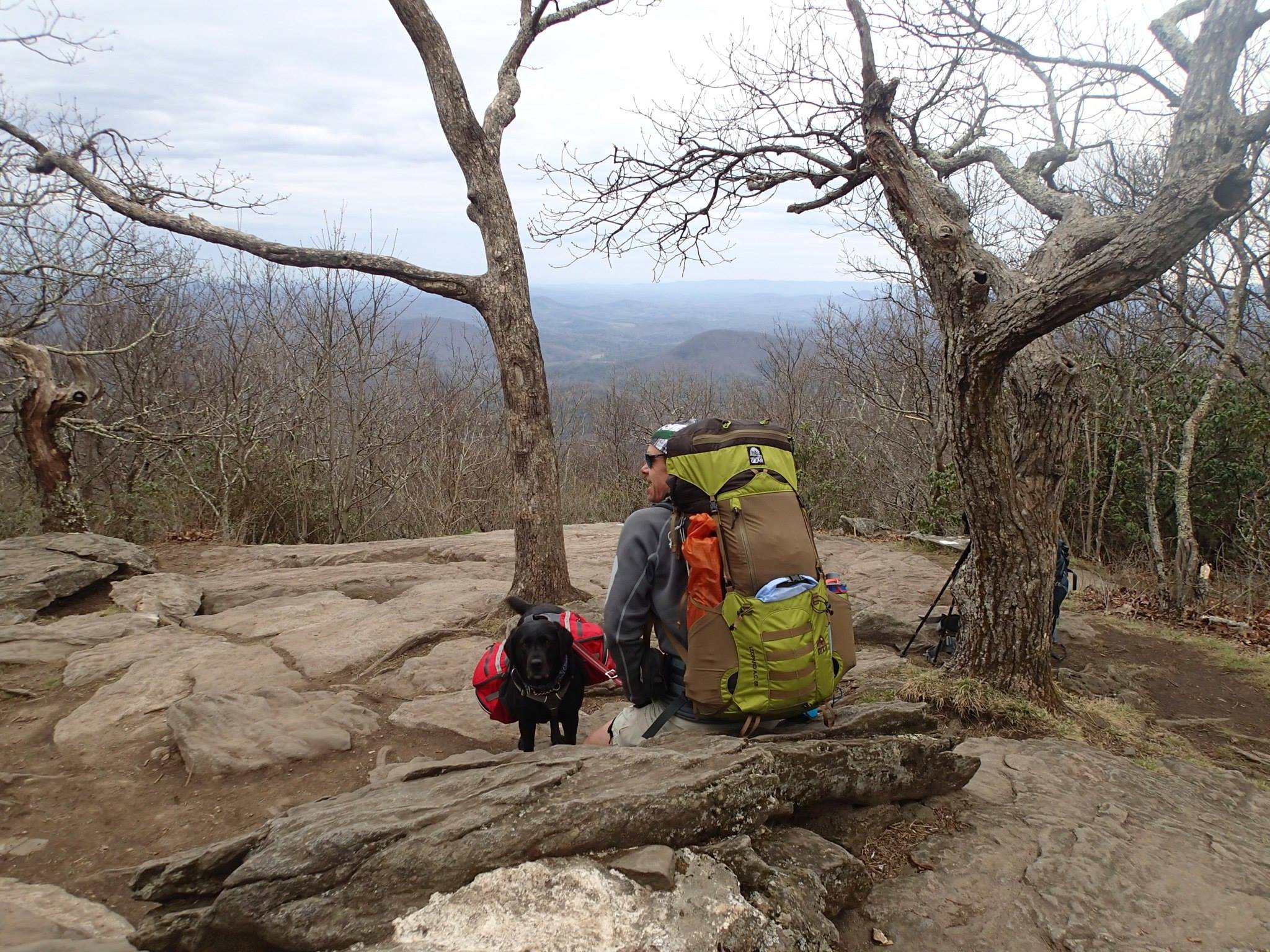
When was your first hike? What influenced your decision to go in the nature?
My first hike, other than my daily training hikes, was on a section of The Appalachian Trail in Grayson Highlands, VA. After deciding to thru hike the trail, my outfitter took me there for a hike so I could get a feel for what I was preparing for and what the trail would be like.
I started hiking as a means to regain some of the independence that I lost to going blind. I found that heading out into nature was the one place I could feel normal. It was the one place that I found I could feel alive again.
Have you ever thought about hiking before the year 2006?
I had never given hiking any serious consideration before I went blind in 2006. In my sighted life, I was into more extreme sports like backcountry skiing, mountain biking, skydiving, and racing Porsches. Though I had been on day hikes, the sport always seemed a bit tame for my liking.
What were your feelings before you started the longest thru-hike, The Appalachian Trail, with only 18 month of preparation, which only few sighted people managed to complete?
My thru hike of The Appalachian Trail (AT) is not my longest thru hike. The 2,654 mile Pacific Crest Trail, which I completed in 2010, is my longest trek to date. With a length of 2,175 miles, The AT was such a huge undertaking that I really did not know what to think. I set out to thru hike the trail to reclaim the life that blindness had taken from me. My only thought was that I would succeed and finish the trail or I would die trying. I didn’t want to go back to the life I had and I knew completing the trail would help me find the strength to change my situation in life. Failure was not an option for me.
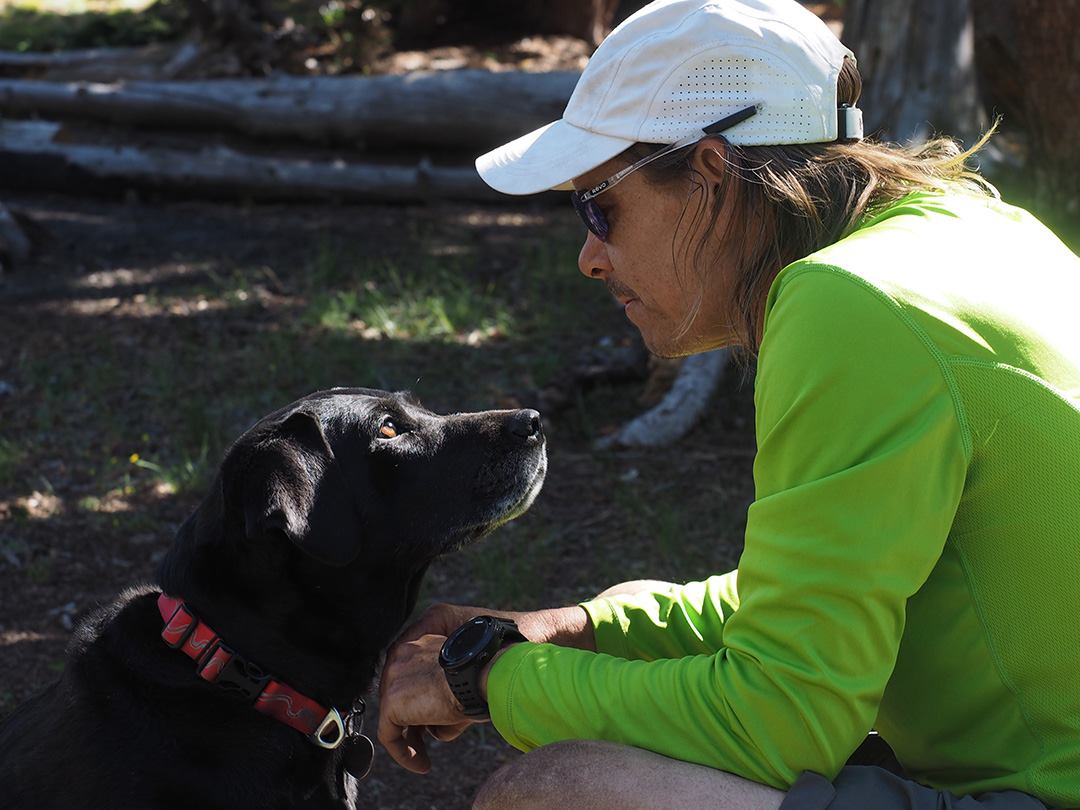 Why did you choose the Appalachian Trail as your first long-distance thru-hike?
Why did you choose the Appalachian Trail as your first long-distance thru-hike?
I heard about the AT and more appropriately, the world of long distance hiking, one afternoon while at my local outfitter in Charlotte, NC. I was there purchasing a set of LEKI trekking poles to help me navigate better on trail. The salesperson had just returned from a thru hike of the AT and his stories were fascinating. Ultimately, I think the trail called out to me, because I decided that I would attempt my own thru hike of the AT before leaving the store that afternoon.
In what month did your first hike started and when was it completed? Which weather conditions were the most difficult on this trek and how did you manage to overcome them?
I began my thru hike of the AT on April 6, 2008 and finished on October 8, 2008, a journey that covered 2,175 miles, 14 states, and took 6 month and 2 days to complete.
On any thru hike, the weather is always a factor. On the AT, my nemesis was rain, wind and snow, because I rely on my hearing to perceive my environment and feel the trail with my feet. When the weather is bad it makes navigation extremely difficult. If I had to choose the worst weather conditions I encountered during my thru hike, I would say it was while I was alone in Maine’s notorious 100 Mile Wilderness. I had been through some horrible storms by the time I got there, but nothing could have prepared me for what it was like hiking through Hurricane Kyle alone. That experience brought new meaning to the word terror for me.
Did everything go like you expected during that legendary hike?
No, everything did not go according to my plan while I was on the AT. There are too many factors that are out of your control when you are a long distance hiker. You must have a master plan for your trek, but be willing to deviate from it depending on situations that arise. This is what makes long distance hiking such a difficult and demanding sport.
What did you feel when you became the first blind person to hike the entire Appalachian Trail?
I was thankful that I was able to complete the trek and very proud of the accomplishment. Even though I had done what was considered to be impossible, I knew that my journey had just begun.
Most people who go hiking will tell you they do it for the gorgeous views. You cannot see the beauty of the nature surrounding you, but you can enjoy it in from another perspective. What other senses bring joy to you? Can you describe your feelings during the hikes?
I actually feel fortunate in the way I have to experience nature. Most sighted people remember only the visual. I use all my remaining senses to remember my experiences that make my memories very robust. I get to remember the smells, sounds, touch, and even taste on occasions. I also think I value the experience more than my sighted counterparts because it takes more planning, effort, and exertion for me to reach the same summit or vista. Every day on trail is a gift and I cherish all of them.
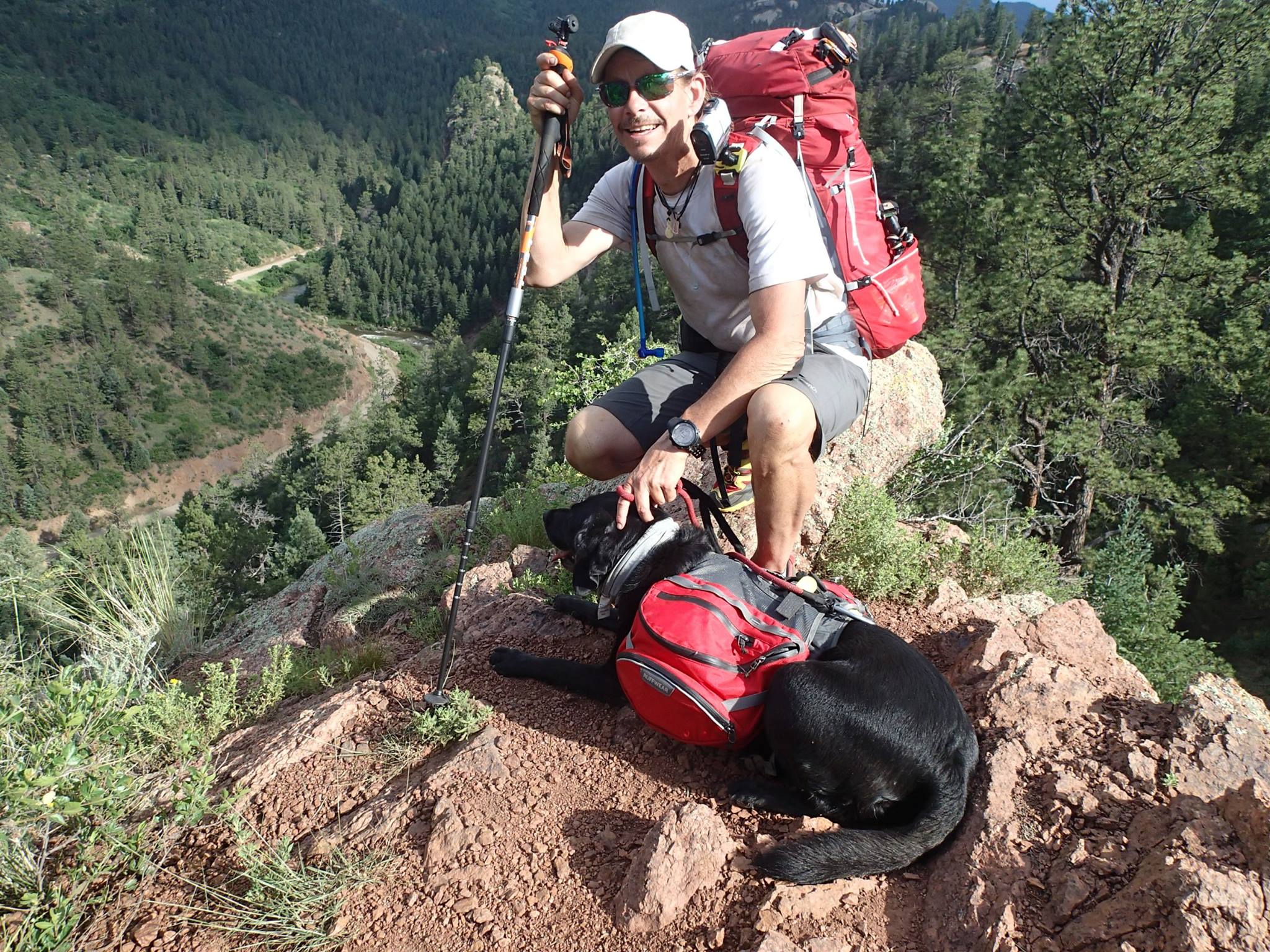
We know that easy hikes are not interesting for you. You are always choosing the ones that are one of the hardest and most challenging. But how do you manage to navigate through these trails without seeing the trail? What are the special skills you have, which help you to pass the most dangerous parts of the trails?
My goal when choosing any trek is to push the barriers of what is considered possible for a blind person to achieve. As a result, I am always looking for trails that will provide me with new challenges. The skills I use have evolved with time and experience, but there are some basics that I continually use and develop. I do not use any type of GPS for navigation. Instead, I calculate distance by keeping track of my cadence and time. Hyper accurate trail directions are emailed to my iPhone, which is adaptive, allowing me to have my own talking trail guide. I continually will search for landmarks that I can touch and identify throughout the day, letting me know where I am and how far I have traveled. The other useful tools that I use are echolocation and feeling the trail through the soles of my shoes. These are the basics, but I will use just about anything available to me to perceive my environment.
What is the most unforgettable hike for you?
Every trek is special for me and I remember them all. Each one is a milestone in my development personally, professionally, and as a blind person. I tend to concentrate more on my upcoming treks, but if forced to choose, The Appalachian Trail and The Colorado Trail would be two of my fondest thru hikes. Both mark significant milestones in my career and stand out in my mind.
Do you prefer to do solo hikes or hiking with a group or a companion is more enjoyable for you? And why?
I will always enjoy hiking with friends, but I am happiest when I hike alone, with my guide dog, Tennille. I began hiking as a way to regain the independence I lost to blindness. When I am alone, I am making all of my own decisions and doing all of my navigation. If problems arise, I must solve them without assistance. This is when I am truly independent and feel most alive. Nature does not care that I am blind. It treats me the same as anyone else. When I succeed, it is based on my own merits.
After hiking several years alone, what inspired you to get Tennille as a companion?
I made a decision to apply for a guide dog for two reasons. First, I hated the way people treated me when I used my white cane. Most seemed to concentrate on my disability as opposed to me as a person. I hoped that having a guide dog would change that. Second, I had started hiking the more technically demanding, remote, and lesser traveled long trails. In order to do this solo, I began working on a system to navigate these trails without needing a partner or members from my hiking team. Part of the system I was working on was getting a guide dog and hoping it could be trained to do backcountry guide work. After a lot of searching, I was partnered with Tennille. Having her has enabled me to achieve true independence in my personal life and my career as a long distance hiker.
 How does Tennille feel on the trail? Did she have any special training before going on the trail?
How does Tennille feel on the trail? Did she have any special training before going on the trail?
Tennille loves trail life and her job while we are out. She gets excited every time I get out our gear and prepare for a trek. Yes, she has a lot of additional training. She is currently the only guide dog to have been successfully trained to do backcountry guide work in addition to performing her normal guiding duties. Most of the experts did not believe that a guide dog could be trained to perform her unique skill set. Her training is continuous and her skills have evolved throughout our partnership. Guide Dogs for the Blind taught me the basics for backcountry work, and the psychology of dogs and how they learn. I have spent years training Tennille, and working with her to develop her skills. She is truly exceptional with her abilities.
Vision is the primary sense the ordinary people are using when going on the trail. What senses do you rely on while hiking?
I rely on all of my remaining senses to perceive my environment. Additionally, I rely on Tennille’s senses and judgment in many cases.
Were there any moments during your hikes when your life was in danger? Can you describe them?
What I do can be inherently dangerous and I understand and accept the risks. On many occasions, I have found myself in dangerous situations, but there have only been a handful of times where I thought I might have pushed my luck too far. While in Maine in late September, 2008, I fell and nearly drown in a series of rough river crossings. Getting out was only the beginning of my troubles. With everything I had wet and no ability to make fire, I was forced to spend one of the longest nights of my life trying to stay awake and doing exercises to fight off hypothermia.
Another instance was above tree line on the Continental Divide while on the Colorado Trail with Tennille in 2015. An unexpected lightning storm came in fast and without warning, leaving us nowhere to run for cover. With rain, wind, hail and lightning all around us, I did the only thing I could think to do. We crouched low under my rainfly from my tent and for nearly an hour, we could do nothing but wait and hope the storm would pass over us. Throughout it all, I was more worried about Tennille than myself. It was my idea to go, not hers. I would have been devastated if something had happened to her. Later, I found out that 12 people were struck and killed by lightning during that storm.
Staying alone on the trail, especially during your first hikes, have you felt fear? What can put a scare into you while being on the trek?
I always experience a certain degree of fear while I am on trail. That is one of the reasons I hike. I do it so I can embrace my fears and push the barriers of what is possible for me to achieve.
Do you have any funny stories in store from your previous hikes?
Yes, when you have spent as much time on trail as I have, there are always humorous stories. Many I have not been given to retell, but I will share one incident. One afternoon while hiking in Colorado, I came across a woman at a stream. When she saw Tennille and me, she began to scream and her dog went crazy. I heard a lot of rustling in the bushes and she yelled at me to stop because she was naked and bathing in the stream. Naturally, I told her not to worry because I was blind and could not see her. This went well until I remembered that I had a cameraman with me and we were filming at the time. He walked up in the middle of our conversation and informed her that even though I was blind and could not see her nakedness, he could. The screaming started all over again. After she got some clothing on, we introduced ourselves. At that point she did not have a trail name, so I took it upon myself to give her one. From that day forward, she was known as Naked and her dog became known as Afraid, taken from the TV show, Naked and Afraid. I thought it was one of the more clever trail names I had handed out over the years. She accepted the name proudly.
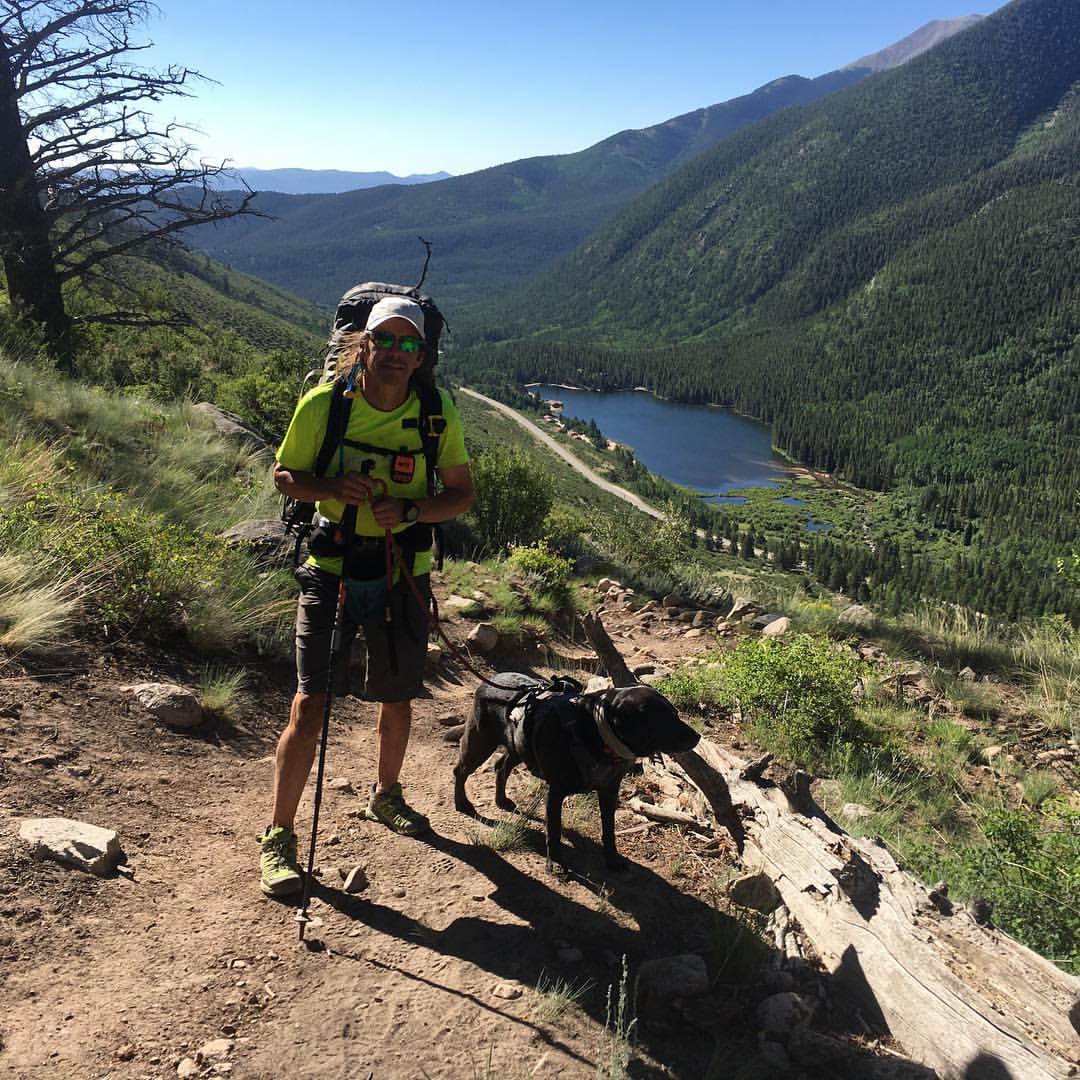
Have you met wild animals on the trails (we mean the once which can threaten the lives of lonely campers or hikers)? How did you act if you felt that a dangerous wild animal is somewhere near you? And how Tennille deals with the wildlife?
Throughout my travels, I have encountered just about every species of animal that can seriously harm or kill a hiker and there is no textbook reaction that will keep you safe in every encounter. I base my reactions on the situation at hand, experience, and always hope for some luck when dealing with the threat.
Tennille has no prey drive and as a result, will never chase after wildlife. She does have different postures that she takes to alert me to different types of wildlife. Some postures I have taught her and others come naturally to her and I have had to learn what she is trying to tell me over time. Fortunately, we have not been attacked so I cannot say what she would do if that were to happen. I believe that she would defend me if necessary and I would do likewise for her.
What are the worst conditions on the trail for you?
The worst conditions on the trail for me are when there is high wind, rain or snow on the trail. These conditions limit my ability to perceive my environment through sound and feel which are two of the main senses that I use to navigate. Having Tennille makes these conditions much easier for me to deal with.
Being an inspiration for so many people, what can you tell our readers to inspire them for hiking?
I have had many people tell me that they would love to get out and hike, but offer many different excuses as to why they are unable to do it. My advice would be that if someone has a dream to get out and challenge himself, he can’t make excuses: he just has to do it. If a guy like me can accomplish what I have, then anyone can if they want something badly enough. I am not crazy and I do not have a death wish. I am just a regular guy who really loves to hike and I just happen to be blind.
We are really thankful to Trevor Thomas for the time spent to share his experience with our readers.
To learn more about this incredible person you may visit his website:
www.blindhikertrevorthomas.com
Or you may follow his Facebook page, where Trevor shares with his followers all his new hikes and adventures:
https://www.facebook.com/trevor.thomas.5891
Leave your comment